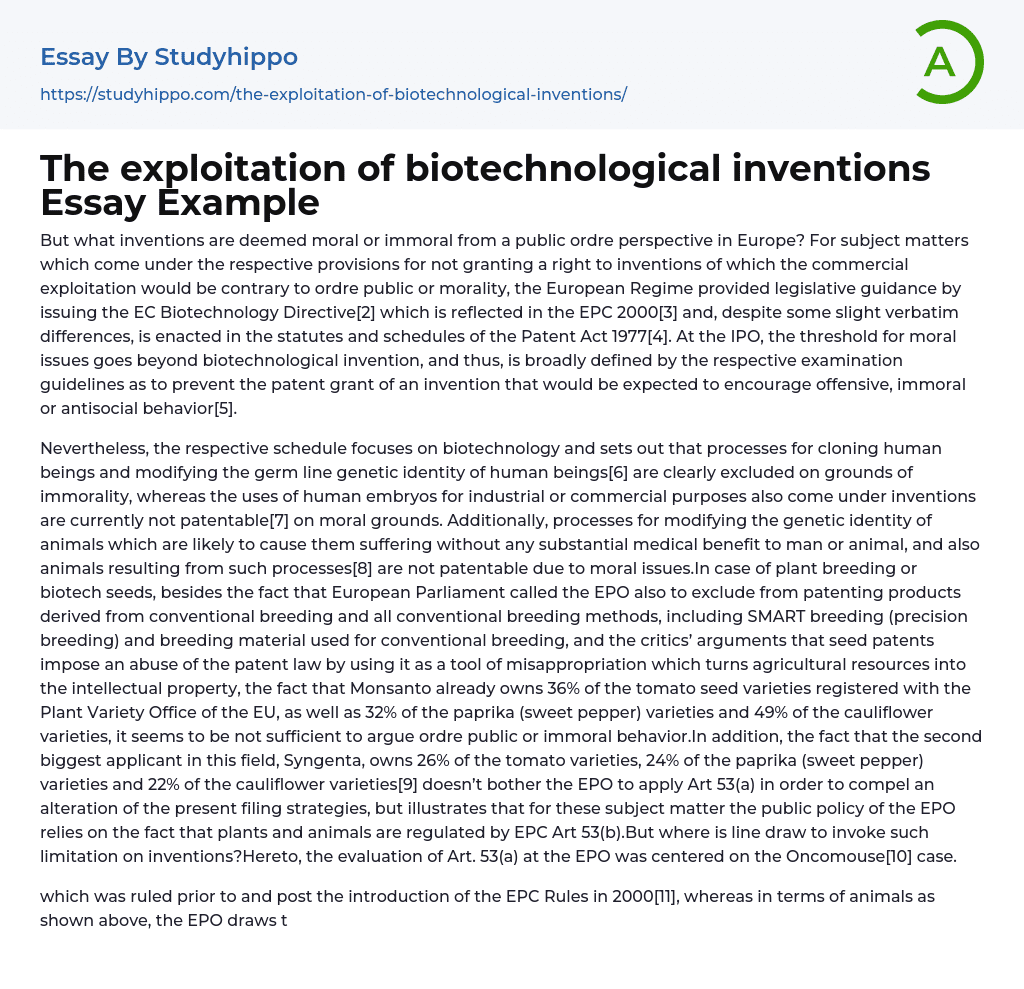In Europe, determining the morality of an invention from a public ordre perspective involves considering whether its commercial exploitation is contrary to ordre public or morality. The European Regime has provided legislative guidance for subject matters that don't qualify for the right to inventions, as specified in the EC Biotechnology Directive. This directive is reflected in the EPC 2000 and is incorporated in the statutes and schedules of the Patent Act 1977, despite some slight differences in wording. At the IPO, moral issues extend beyond biotechnological inventions and are broadly defined in the examination guidelines. The guidelines aim to prevent the granting of a patent for an invention that could encourage immoral, offensive, or antisocial behavior.
The schedule for biotechnology explicitly prohibits the cloning of humans and altering the genetic makeup of humans. These actions are deemed immo
...ral. Additionally, the use of human embryos for industrial or commercial purposes is considered an invention that is currently not eligible for patent on moral grounds.Despite criticism and calls from the European Parliament to exclude products derived from conventional breeding and breeding material from patenting, along with concerns about the potential abuse of patent law in the agricultural industry, there are still ongoing debates on where to draw the line in limiting patentable inventions. Moral issues have also been raised, leading to the decision that processes which alter the genetic identity of animals causing suffering without medical benefit are not patentable, nor are animals produced through such processes. While Monsanto owns a large percentage of registered tomato, paprika, and cauliflower varieties, and Syngenta owns a significant portion as well, this has not yet resulted in limitations on patenting i
these areas. However, the fact that plants and animals fall under regulation by EPC Art 53(b) suggests that further evaluation is necessary in determining patentability. All of these issues must be considered when determining if certain inventions can be patented.The Oncomouse[10] case was the main focus of 53(a) at the EPO.
The ruling on the patentability of biological processes was established both before and after the introduction of EPC Rules in 2000. The EPO employs the utilitarian balance test to determine the morality of animal experimentation based on factors such as animal suffering, environmental risks, and benefits to mankind. If an invention causes unnecessary animal suffering, it is considered immoral and not patentable under Art.53(a) and Rule 28. However, product claims and product-by-process claims are not affected by this non-patentability from the EU and UK perspective. In a case involving Plant Genetic Systems, the EPO Opposition Division did not apply the cost-benefit test because there was insufficient evidence to support objections.Although it may be seen as controversial from an ethnic standpoint, the EPO's Technical Board of Appeal denied the opposition's motion and upheld the patent grant, citing the EPO's duty to protect the longstanding societal norms[14] of Europe, as well as to serve both public policy and science[15]. As a result, the EPO has taken on issues pertaining to public safety and physical integrity of individuals within society. In light of landmark cases, including Regina (in ex parte Quintavalle) v Secretary of State for Health[16], which expanded the definition of "embryo" beyond a live human embryo produced by fertilization to include an embryo created without such means, such as through cell nuclear replacement[17], another controversial topic
arises. Specifically, when it comes to stem cells obtained through the destruction of a human embryo, the EU takes a cautious approach to deny patentability in this area of research due to ethical concerns. On the other hand, the UK's argument presented to the EPO Enlarged Board of Appeal in the WARF[18] case effectively balances ethics with the future possibilities of stem cell research.
- Jurisprudence essays
- Social Injustice essays
- Juvenile Justice essays
- Business Law essays
- Contract essays
- Consumer Protection essays
- Property essays
- Ownership essays
- Agreement essays
- Common Law essays
- Contract Law essays
- Justice essays
- Security essays
- Tort Law essays
- United States Constitution essays
- Crime essays
- Lawsuit essays
- Treaty essays
- Family Law essays
- Marijuana Legalization essays
- Constitution essays
- War on Drugs essays
- Court essays
- Jury essays
- Police essays
- Protection essays
- Community Policing essays
- Criminal Law essays
- Judge essays
- Lawyer essays
- Employment Law essays
- Copyright Infringement essays
- Injustice essays
- Intellectual Property essays
- Breach Of Contract essays
- Internet Privacy essays
- Cyber Security essays
- Bill Of Rights essays
- Civil Liberties essays
- First Amendment To The United States Constitution essays
- Fourth Amendment To The United States Constitution essays
- Second amendment essays
- Animal Cruelty essays
- Law Enforcement essays
- Juvenile Justice System essays
- Surveillance essays
- Forensic Science essays
- Crime Prevention essays
- Criminal Justice essays
- Criminology essays




